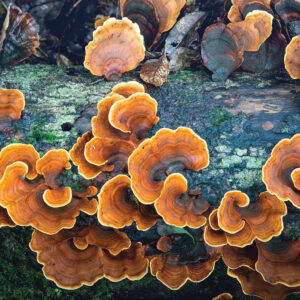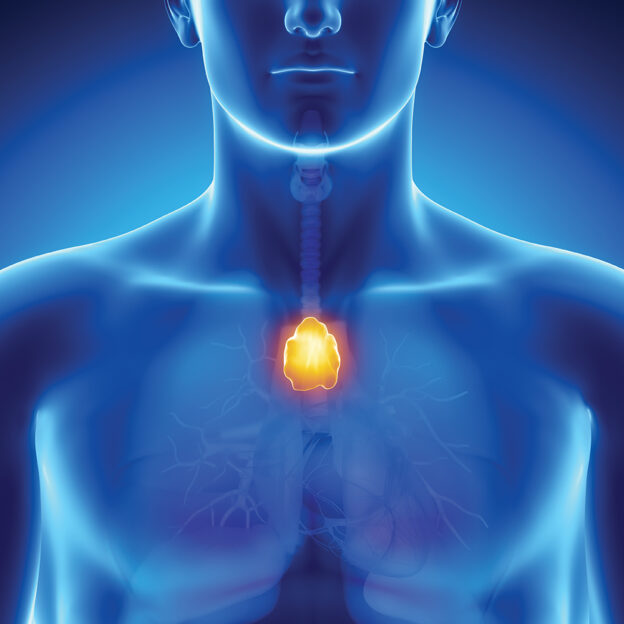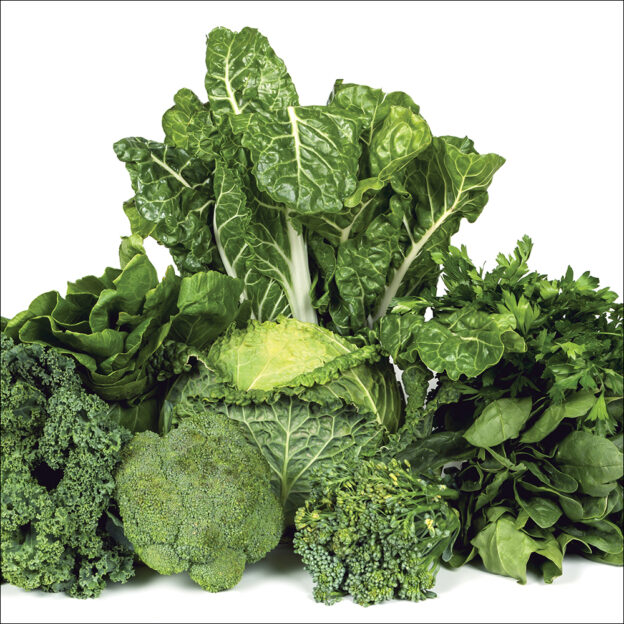Table of Contents
By Paul Stamets

Few people know that we are more closely related to fungi and other microbiomes than to any other kingdom. 650 million years ago, we split from fungi. We evolved to encircle our nutrients within a cellular sack, a stomach, and digested nutrients within. Fungi evolved to externally digest nutrients and projected a fine filamentous, cobweb-like cellular network known as mycelium.
In both cases, over millions of years, choosing beneficial bacteria to aid in this process became essential for good digestion. By selecting commensal bacteria to help digest food, both humans and mushroom mycelium created complex communities—microbiomes—to help digestion, prevent disease, and extend longevity. Not only do we benefit from a healthy microbiome, but so too does the mycelium.
Mushrooms and Mycelium
The mushroom is a fruit of the mycelium like an apple is to an apple tree. Mushrooms are made of compacted mycelium but are materially different than mycelium. Mushrooms are nutritionally dense, packed with polysaccharides, proteins, minerals, and vitamins (B, and D), are low in fat (5 percent, mostly linoleic acids), and are free of cholesterol. The cobwebby mycelium exudes enormous suites of enzymes as it grows in the ground beneath our feet and in the forests around us.
Mycelium is the cellular foundation of our food webs, creating the rich soils so necessary for life. Mycelium is a digestive membrane that also destroys many environmental toxic wastes, and has spawned a new science—called “Mycoremediation.” Promoting mycelium in your garden and yards helps neutralize many of the toxins that challenge our immune systems. Partnering with mycelium improves environmental health—outside and inside our body
Bacteria in our Microbiomes
Mycelium’s selection of bacteria, in the creation of guilds of microbes, is essential for the mycelium’s survival. The mycelium chooses suites of bacteria that not only help it digest food, and stave off predators, but also help the plant communities that give rise to the ecosystems in which the mycelium resides, so fruits (mushrooms) can be produced. This means that mycelium-based products can aid digestion and help promote beneficial bacteria in our microbiomes.
The nutritious and delectable mushrooms are very temporary, typically up only for a few days, attracting us and many other animals. Of great interest is that we know now mushrooms are prebiotics for the microbiome—augmenting the growth of beneficial bacteria such as Acidophilus and Bifidobacterium. Recent research now shows that Reishi and Turkey Tail mushrooms not only support the immune system, but also balance the microbiome in favor of these beneficial bacteria, resulting in better digestion, and, amazingly, potential weight loss!
Consuming mushrooms and mycelium adds many benefits to our pursuit of good health. Just make sure the products you consume are Certified Organic, US grown (better inspections), and that you know where they are grown and who is growing them. This is so important because there is a lot of deceptive advertising motivated by maximizing profits by minimizing costs, which jeopardizes quality. Adding mushrooms to your diet is probably one of the most important additions to the foods you can ingest that will improve your health!
—
This feature is reprinted by permission of the author from https://fungi.com/blogs/articles/mushrooms-and-mycelium-help-the-microbiome
Paul Stamets is an expert in the habitat, medicinal use, and production of fungi. He has received numerous awards, including the Invention Ambassador for the American Association for the Advancement of Science and the National Mycologist Award from the North American Mycological Association. His passion is to preserve and protect as many ancestral strains of mushrooms as possible from pristine woodlands and to help ecosystems worldwide.
His books include Mycelium Running: How Mushrooms Can Help Save the World, Growing Gourmet & Medicinal Mushrooms, and Psilocybin Mushrooms of the World. He collaborates with numerous scientific organizations and research institutes and is currently testing extracts of rare fungi strains at the NIH (National Institutes of Health/Virology) and with Washington State University/United States Department of Agriculture against a wide panel of viruses pathogenic to humans, animals, and bees. He is also the founder and owner of Fungi Perfecti, LLC (www.fungi.com), makers of the Host Defense Mushrooms (www.hostdefense.com) supplement line.
Sources
- On Opisthokonta. https://en.wikipedia.org/wiki/Opisthokont
- Kumar Pallav, Scot E Dowd, Javier Villafuerte, XiaotongYang, Toufic Kabbani, Joshua Hansen, Melinda Dennis, Daniel ALeffler, David S Newburg and Ciarán P Kelly. “Effects of polysaccharopeptide from Trametes versicolor and amoxicillin on the gut microbiome of healthy volunteers: A randomized clinical trial.” Gut Microbes. 2014 Jul 1;5(4):458-67. http://www.tandfonline.com/doi/abs/10.4161/gmic.29558
- Nathalie M. Delzenne & Laure B. Bindels. “Gut microbiota: Ganoderma lucidum, a new prebiotic agent to treat obesity?” Nature Reviews Gastroenterology & Hepatology. 12, 553–554 (2015). http://www.nature.com/nrgastro/journal/v12/n10/full/nrgastro.2015.137.html
- Vanessa Moser. “The Human Microbiome: The Brain-Gut Axis and its Role in Immunity.” Graduate Research Projects. Paper 7. 12-2014. http://knowledge.e.southern.edu/gradnursing/7





